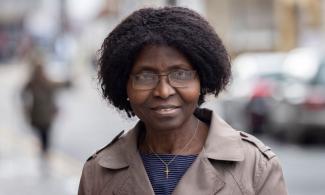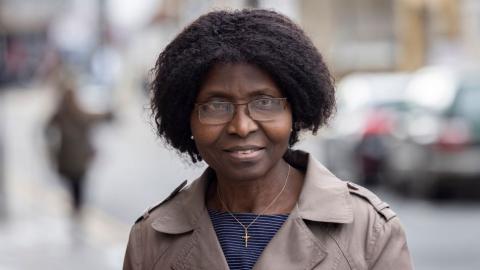
She claimed she had worn the gold cross around her neck every day of her life since childhood.
A Nigerian Catholic nurse, Mary Onuoha, who was dismissed from her job at the Croydon University Hospital over her refusal to remove her small gold cross necklace, has explained the significance of the piece of jewellery to her faith.
According to her, the small gold cross is a symbol of the love of Jesus to her, stating that it is of central importance to her faith, removal of which will make her feel she has been compromised, Daily Mail reports.

She claimed she had worn the gold cross around her neck every day of her life since childhood.
She was quoted as saying,
“Every time I look at it, I think of Jesus, His love, how much He loved me, and the need for me to love Him back.”
However, trouble started when Mary's employers at the South London hospital where she worked as a theatre practitioner for 19 years took a different view, and in recent years, repeatedly asked her to remove the cross, a present she got during her baptism.
She said her employers told her the necklace 'harboured bacteria', but she believes she was targeted for displaying a symbol of her Christian faith, stating that other colleagues were allowed to wear other items expressing their religious beliefs: turbans, hijabs or bracelets.
She said a manager had called her away from her nursing duties in an operating theatre in the middle of surgery to discipline her for wearing the gold cross – potentially risking patients' safety.
When she refused to take it off, Mary was reportedly moved to clerical duties and became subject to what she describes as a sustained campaign of bullying that left her unable to work.
Having been signed off with stress, last October she brought a legal case against Croydon Health Services NHS Trust on the grounds of harassment, victimisation, direct and indirect discrimination, and constructive and unfair dismissal.
Last week, she won a case against Croydon NHS Trust on the grounds of harassment, victimisation, direct and indirect and unfair dismissal.
Judge Daniel Dyal ruled that Mary had been constructively dismissed in a way that was both unfair and discriminatory.
He said the trust had created a 'humiliating, hostile and threatening environment' and that when Mary complained, the response had been 'offensive and intimidating'.
Mary as is, however, of the opinion that the case exposes the hostility and discrimination experienced by many Christians in the workplace, a view shared by the former Archbishop of Canterbury, Lord Carey.
She told the Mail, “This has always been an attack on my faith. My cross has been with me for more than 40 years. It is part of me, and my faith, and it has never caused anyone any harm.
“At this hospital, there are members of staff who go to a mosque four times a day and no one says anything to them.
“Hindus wear red bracelets on their wrists and female Muslims wear hijabs in theatre. Yet my small cross around my neck was deemed so dangerous that I was no longer allowed to do my job.”
It is a turn of events for the Nigerian, who had left her country in 1988 to pursue her dream of becoming a nurse in ‘a free country'.
“I am a strong woman, but I have been treated like a criminal”, she said. “I love my job, but I am not prepared to compromise my faith for it, and neither should other Christian NHS staff in this country.”
According to her, the Christian faith was at the heart of the Nigerian village where she was raised, the eldest of ten siblings in a loving family. And it was there that a family tragedy set her on the path to becoming a nurse.
“When I was 15, my beloved two-year-old brother died of measles," she recalls. “I was so sad that there wasn't the medical care available for him that could have saved him at that time in the area where I lived. This made me passionate about caring for people and about medicine.
“I was determined to help my mother and make sure it did not happen again.”
Mary moved to the UK with her husband Charles, settling in South London where the couple has lived ever since with their family and where Mary qualified as a nurse.
In November 2001, she started to work at Croydon University Hospital, employed latterly as a theatre practitioner, a nursing role performed primarily in the operating theatre and providing pre- and post-operative care. Her cross was sometimes concealed by her scrubs but was visible on other occasions.
However, it never attracted comment until 2014, when the theatre manager at the time asked her to remove it on health-and-safety grounds.
“I refused and said words to the effect of 'What about hijabs, turbans and kalava bracelets?” Mary recalls. “She said she would get back to me but did not do so.”
A year passed without further incident until, in late 2015, a matron asked Mary to wear a longer chain to conceal the cross under her uniform.
“Again, I asked why I should hide my faith while others were allowed to show their own. She did not take the matter any further.”
However, several other managers asked her to conceal or remove her cross, deeming it a health-and-safety risk. If not, Mary was told, the matter would face 'escalation'.
Mary continually refused.
"It felt like bullying,” she said.
In November 2016, Mary was attending a patient in surgery when her manager came into the operating theatre and ordered her into a side room, saying she needed to discuss her necklace.
“I said 'I cannot leave the patient', but the manager insisted. I was so embarrassed. Theatre is a pressured environment, and I was astonished that senior staff were prepared to potentially endanger a patient's life in order to intimidate me to remove it.”
This was the start of what she described as an ongoing campaign of intimidation by senior hospital managers, during which she was subjected to an investigation into her conduct.
By November 2018, she was suspended from clinical duties and instead assigned clerical work and told that security would be called if she attempted to enter a theatre area while still wearing her cross.
Effectively, she was ostracised. “I am a strong woman, but this was demeaning to me and caused me a lot of stress. It was degrading.”
She added: “People did say to me, 'Why don't you just remove your necklace?' But I know that if I did, I would feel as if I had compromised, that I would have stepped back from my faith.
“I don't want to be a lukewarm Christian. I love my job, but God comes first.”
Nonetheless, by June 2020 the stress had become too much and Mary was signed off work by her doctor.
Two months later she resigned, effectively forced out of a job she loved.
For months afterwards she was unable to work, though she has now found a new job.
“I never thought I would ever be in a situation like this, but I was determined to get through it,” she says.
She was equally determined to hold her employers to account – and last week her courage was vindicated by Judge Dyal who, in a damning ruling, said that the dress-code policy was applied 'in an arbitrary way' and with 'no cogent explanation' why plain rings, neckties, hijabs and turbans were permitted, but a cross necklace was not.
Her financial compensation will be determined at a later hearing.
For Mary, it is the principle that really matters – a welcome and long overdue boost for Christian freedom. ”I am so pleased that the tribunal has defended the freedom to worship God. I know there are other Christians across the country experiencing similar issues to me – and I hope this encourages all of them to be courageous.”
Holding the same views, Andrea Williams, chief executive of the Christian Legal Centre, who supported Mary in her legal battle told the Mail.
“The courts have finally admitted that the cross is a Christian symbol in a crucial ruling that protects a Christian's right to express their faith in the workplace,” she said.
“The tribunal has found that the cross is not just a piece of jewellery or a fashion accessory, but ruled that it is a symbol of Christianity and it is of central importance to the faith of many Christians.
“This victory has, however, been achieved at a high price."